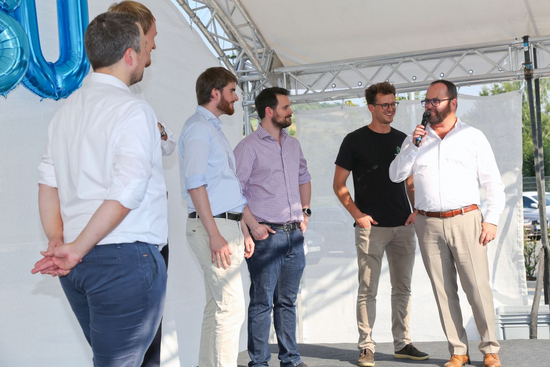LAUDA DR. R. WOBSER GmbH & Co. KG presented an in-house exhibition with four highly innovative start-up companies at an event held to mark the 80th birthday of the former Managing Director and current Advisor and Shareholder Dr. Gerhard Wobser.
Cloud Software with Artificial Intelligence (AI) for the Optimization of Heating Systems and Heating Networks is an innovative project of ENER-IQ GmbH (Würzburg/Hamburg). According to the Federation of German Heating Industry (BDH), around two thirds of heating systems and district heating networks are operated inefficiently. The reasons for this include defective components, inefficient control settings and, above all, deficient system tuning due to a shortage of qualified personnel. ENER-IQ's solution approach consists of sensor-based recording of the heat generation and distribution parameters. The collected data is transferred to a cloud application developed by the start-up company. From there, the systems and properties are monitored, the data analyzed, key performance indicators calculated for more efficient management and data supplied for optimization purposes. In the long term, it is used for the AI-supported optimization of the systems and remote adjustment as well as recommendations for action for tradesmen.
MagnoTherm Solutions from Darmstadt develops energy-saving and gas-free refrigerating or heating machines based on magnetocaloric materials. Compressors for refrigeration plants have reached their efficiency limit. Cold and heat are generated using magnetocaloric materials such as lanthanum-iron-silicon instead of greenhouse gases in the device developed by the start-up company. The solid body heats up when it is brought into a magnetic field and cools down when it leaves it. The heat or cold is conducted away from the material and made usable via a water mixture. Significant energy savings can be achieved through the isentropic process. The lower pressures and water as a medium mean that the cooling unit is safe for the end user and requires less maintenance. Since the materials can be adjusted to different temperature ranges, it is possible to create highly individual and energy-efficient applications.
The patented invention of watttron GmbH in Freital near Dresden is an innovative system for industrial heating processes, initially for the packaging industry. LAUDA has been cooperating very closely with this award-winning company in various areas for almost a year now in an atmosphere of mutual trust. The modular heating system enables material savings of up to 30 percent to be achieved in the manufacture of packaging. Different shapes can be realized according to the customer's wishes by linking modules in a sequence. Each module has 64 heating pixels which can all be individually controlled and regulated. This makes it possible to create individual heating profiles which can be selectively changed within seconds. This process allows packaging to be produced more efficiently in a thermal process or with contact heating. For example, the material in areas of a yoghurt pot which require high deformation is heated more, while the areas which are hardly or only slightly deformed are heated less. In principle, the heating process developed by watttron can also be used in many other industrial precision heating processes such as bio, pharmaceutical, chemical and automotive technology.
The Berlin-based start-up company Coolar has developed a cooling system which can make use of adsorption cooling technology based on water as a sustainable refrigerant for the first time. This means that compact refrigerators and transport boxes operated without electricity can be developed without climate-damaging, toxic or highly flammable substances. The first application was a so-called off-the-grid medical refrigerator for off-grid health care facilities which was successfully tested in completely self-contained operation in the field in Tenerife at the beginning of 2019. This solution means that Coolar can offer a low-cost, ecologically sustainable and pollutant-free solution for medicine and vaccines without the need for electricity, batteries or complicated control technology. In addition, the cooling system, whose compactness and simple control system are uniquely flexible, provides a sustainable, water-based alternative for a large number of small to medium-sized fields of application in the cooling technology industry, which is currently undergoing radical change.
"We aim to use these collaborative partnerships to identify and become aware of technical trends and technological developments at an early stage and provide innovative start-ups with cooperation on equal terms," underlined Dr. Gunther Wobser, CEO of LAUDA, speaking at the presentation of the four start-ups and their inventions. "LAUDA has carried out some excellent preliminary work in cooperation with start-up companies," said Robert Tietze, who has been Start-Up Manager at LAUDA since May 2019, talking about his experiences of the first few months. It had become apparent that universities provide a concentration of experts within specific areas of research from which interesting start-up companies arise.
